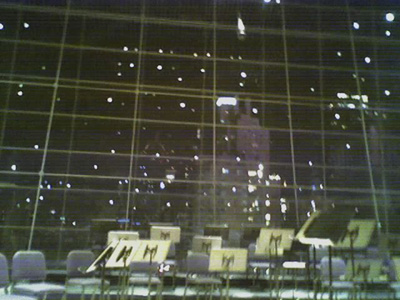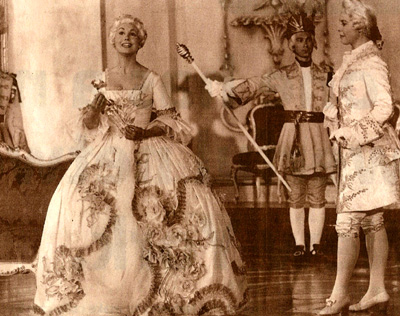In which we have a look at this week's
New York Times Book Review, even though we're on vacation.
There are three strong works of fiction, this week, and I
wonder how many readers will read all of them. (I've already got a signed copy
of Special Topics in Calamity Physics.) Three is also the number of
important works of nonfiction are reviewed this week, The Wonga Coup, The
Shia Revival, and, of course, Fiasco. I hope that RumChen & Co lose
no time brand author Thomas E Ricks as a giver of aid and comfort to the enemy.
Fiction
¶ Special Topics in Calamity Physics, by Marisha Pessl.
It's on the cover and it gets a lot of space. "The joys of this shrewdly
playful narrative lie not only in the high-low dives of Pessl's tricky
plotting, but in her prose, which floats and runs as if by instinct,
unpremeditated and unerring." - Liesl Schillinger.
¶ A Woman in Jerusalem, by A B Yehoshua. "This novel has about it
the force and deceptive simplicity of a masterpiece: terse (or relatively
so, given than Yehoshua's novels are often long), eminently readable but
resolutely dense." - Claire Messud.
¶ The Girls, by Lori Lansens;
Half Life, by Shelley
Jackson. "Just like certain sets of more ordinary twins, however, these two
books are alike only on the surface. Their aims are as different as the
styles in which they are written. The Girls, by Lori Lansens, is a
ballad, a melancholy song of two very strange, enchanted girls who live out
their peculiar, ordinary lives in a rural corner of Canada. Shelley
Jackson's Half Life is the textual equivalent of an installation, a
multivocal, polymorphous, dialogic, dystopian satire wrapped around a murder
mystery wrapped around a bildungsroman." - Stacey D'Erasmo.
¶ Nancy Culpepper: Stories, by Bobbie Ann Mason. "Even in its
lighter moments, Mason's fiction can inspire a yearning for something lost -
whether it's a person, a place of a moment." Hillary Frey.
¶ The Scent of Your Breath, by Melissa P (translated by Shaun
Whiteside. "There are moments when a little self-awareness would be welcome.
One wonders, for example, how "Mum" would react to her daughter's
adventures. But perhaps that is for another book. 'And because I have never
had anything to lose,' Melissa confesses, as if anticipating a question from
the reader, 'in pretending to have a diary I wrote a novel'." - Sheelah
Kolhatkar.
Nonfiction
¶ Building Houses Out of Chicken Legs: Black Women, Food, and
Power, by Psyche A Williams-Forson. "Williams-Forson shuttles easily
between the language of the feminist academy and that of the personal
confession, according the latter a value that, in the context of a scholarly
work, may make some readers cringe. 'By my own witness, too much
acknowledgment and praise of one "sista's" fried chicken over another's can
suggest that the pastor is enjoying something at that sista's house other
than just "the gospel bird'.'" - Matt Lee and Ted Lee.
¶ The Parliament of Man: The Past, Present, and Future of the United
Nations, by Paul Kennedy. "It takes a brave man, or a blithe one, to
write about the United Nations as if it had some purpose other than either
to obstruct or to accommodate American policy goals. I'm not sure which
category the Yale historian Paul Kennedy belongs to, but it's safe to say
The Parliament of Man will earn him no credit from the America-first
crowd." - James Traub.
¶ A Land Gone Lonesome: An Inland Voyage
Along the Yukon River, by Don O'Neill. "Writers are human
conservationists perforce, and O'Neill is a fierce protector. 'As people are
eliminated from Alaska's parks, new stories cease to be created and the
tradition dies,' he writes. O'Neill casts a mold of the Yukon landscape
before nature takes back the last human footprint. He reintroduces us to our
more resourceful selves, and reminds us that some people - nutty as they may
seem - actually want to live those bumper sticker slogans on beat-up Volvos.
To O'Neill, it's only fair to leave the scrappy individualists their
hidey-huts and fish wheels, their trapping lines and birch canoes, not only
for their sake but for ours: to leave a little something for the American
imagination, an elemental way of life that is lonely and lovely and very
nearly gone." - Louise Jarvis Flynn.
¶ Feeding the Monster: How Money, Smarts, and
Nerve Took a Team to the Top, by Seth Mnookin. "The publisher
presumably hopes that Feeding the Monster will catch on with the same
audience that made Moneyball such a hit, but the real news here - the
triumph of analysis and statistical study over instinct and sentimentality
in the running of a baseball team - may be a bit old now, and Mnookin,
though an excellent reporter, is not as stylish a writer as Michael Lewis."
- Charles McGrath.
¶ The Unsayable: The Hidden Language of
Trauma, by Annie G Rogers. "For Freud, Lacan and Rogers, the
unconscious is as complex and sophisticated in its organization as is the
conscious, and as individual: each psyche requires its own lexicon. ...
Rogers's ability to listen and perceive has an equally rare authority. It
isn't everyone who can hear what we don't allow ourselves to say." - Kathryn
Harrison.
¶ The Sound of No Hands Clapping,
by Toby Young. "Who knows, maybe this is the correct view of the world.
Maybe our lives are nothing but a series of cold, social calculations and
then we die. Maybe I didn't like this book because, years ago at a party,
Young spilled a drink on me and hit on the girl I was with. In which case,
I'd have just one word for him: Gotcha." - Hugo Lindgren.
¶ The Wonga Coup: How Thugs and a Ruthless
Determination to Create Mayhem in an Oil-Rich Corner of Africa,
by Adam Roberts. "At times Roberts overplays the gruesome nature of
Equatorial Guinea's dictatorial rulers, Macias Nguema and his nephew Obiang,
particularly when it comes to accusations of cannibalism, but nonetheless he
draws a convincing picture of wholesale corruption and brutality on the part
of the country's ruling class." - Caroline Elkins.
¶ The Humboldt Current: Nineteenth-Century
Exploration and the Roots of American Environmentalism, by
Aaron Sachs. "The Humboldt Current is not lacking in resonant voices.
Sachs's subjects are strong, and he describes them in extensive detail. The
difficulty is that there are perhaps too many subjects and too much detail -
digressing at length from Humboldt. As interesting as his followers were,
their stories beg for a fuller portrait of the extraordinary figure who
inspired them." - Candice Millard.
¶ The Shia Revival: How Conflicts Within
Islam Will Shape the Future, by Vali Nasr. "Amid such an
ancient rivalry, how can American Mideast policy effectively advocate rule
of law, transparency and human rights - the cornerstone of any democracy?
That's a question that Vali Nasr doesn't address, a revealing omission in an
otherwise riveting analysis. One suspects that far from being a superpower,
the United States is about to become a superpawn. Whatever the final chapter
of this drama, Washington won't write it. Muslims will." - Irshad Manji.
¶ Fiasco: The American Military Adventure in
Iraq, by Thomas E Ricks. " For all his depictions of the
Americans' shortcomings, however, Ricks never explains why so many mistakes
occurred. Why, for instance, was the military leadership, after vowing not
to replicate the experience of Vietnam, so easily rolled by Rumsfeld and
company? And how could an administration that started what was, at bottom, a
war of the intellectuals, be so bereft of insights and ideas about Iraq?
Part of the answer is surely to be found in hubris as in the incompetence
portrayed by Ricks. In this regard, it's worth recalling that the scholar
Fouad Ajami, who helped influence Vice President Dick Cheney in pushing for
a makeover of Arab regimes, published a book in 1998 called The Dream
Palace of the Arabs. The longer the war drags on, the clearer it becomes
that Bush and his paladins have been living in their own dream palace." -
Jacob Heilbrunn.
In her Essay, "Writers on Trial," Maureen Freely discusses the notorious
Article 301 of the Turkish criminal code, under which the novelist whose work
she is currently translating into English, Orhan Pamuk, was preliminarily tried
last winter before charges of "denigrating Turkishness" were dropped. Other
writers, such as Elif Shafak (who sounds very appealing), might not be so lucky.



